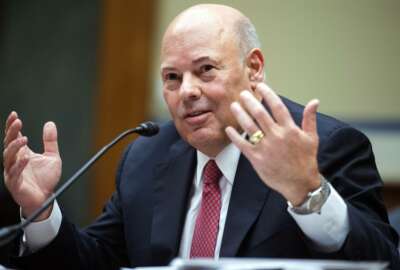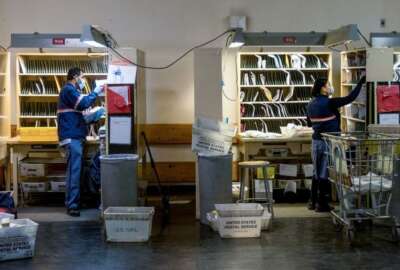DeJoy: Expect USPS mail prices to keep going up at an ‘uncomfortable rate’
Postmaster General Louis DeJoy expects the Postal Service will need to keep raising prices on its monopoly mail products for the foreseeable future, as part of ...
Postmaster General Louis DeJoy expects the Postal Service will need to keep raising prices on its monopoly mail products for the foreseeable future, as part of a 10-year reform plan to improve its long-term financial health.
DeJoy said Thursday said the mailing industry needs to be prepared for USPS to raise prices on its market-dominant products “at an uncomfortable rate,” until it reaches a point where the agency is on track to be self-sustaining in the long term.
“While our pricing decisions are ultimately made under the authority of the Board of Governors, in the near term, I will most likely be advocating for these increases,” DeJoy said during a meeting of the USPS Board of Governors. “I believe we have been severely damaged by at least 10 years of a defective pricing model, which cannot be satisfied by one or two annual price increases, especially in this inflationary environment.”
DeJoy said USPS is also within “striking distance” of achieving its 95% on-time delivery goal for market-dominant mail, and that on average, it currently takes the agency takes 2.7 days to deliver market-dominant mail.
“This means the speed to deliver is on average as fast as it was pre-pandemic, pre-first class standard changes — and pre-Louis DeJoy,” DeJoy said.
This quarter, USPS delivered 87.9% of first-class mail on time, compared to delivering 78.1% of mail on time for the same period last year.
USPS last month, on the same day President Joe Biden signed a major postal reform bill into law, announced it would raise market-dominant mail prices by about 6.5% on July 10.
Under these new prices, the price of a first-class stamp will go up from 58 cents to 60 cents.
The Postal Regulatory Commission implemented a new rate-setting system for USPS in 2020, giving the agency flexibility to set prices higher than the rate of inflation.
The Alliance of Nonprofit Mailers and Association for Postal Commerce filed a petition with the commission last month urging the regulator to reconsider its rate system for USPS, given that Congress has passed the Postal Service Reform Act.
The associations led mailers in a lawsuit challenging the rate-setting system last year, but the U.S. Court of Appeals for the D.C. Circuit ruled against them, arguing that the PRC has firm control over the regulation of USPS pricing.
While the Postal Service Reform Act recently is expected to save USPS $107 billion in total, those savings will begin to show in USPS financial figures for the third quarter of this fiscal year.
USPS ended the second quarter of fiscal 2022 with a $639 million net loss, compared to an $82 million net loss for the same period last year.
First-class mail revenue increased by $296 million this quarter, a 5% increase compared to the same period last year, despite receiving 82 million fewer pieces of mail — a 0.6% decrease. USPS said first-class mail volume remains lower than pre-pandemic levels, and expects volume declines will continue.
USPS package revenue increased by $98 million, a 1.3% increase, despite delivering 94 million fewer packages — a 5% decrease compared to the same period last year. Package volume remains higher than pre-pandemic levels.
“The pandemic has significantly transformed the mix of mail and packages processed through the Postal Service’s network and the Postal Service anticipates that its volumes and mix will not return to pre-pandemic levels,” USPS wrote in a press release Thursday.
USPS Chief Financial Officer Joe Corbett said the agency remains on track to achieve “break-even performance” for the 10-year period from fiscal 2021 to 2030, reversing a projected $160 billion loss.
DeJoy said USPS over the next several months will finalize plans to “reinvent and modernize” its network of processing centers and delivery units.
“A massive effort is well underway to improve on poor operating practices that have been embedded into our system over the past many years,” he said.
USPS Board of Governors member Ron Stroman, a former deputy postmaster general, said the postal reform legislation means the “the Postal Service now has a fresh chance for a new financial beginning.”
“We are beginning the long-overdue work of transforming our network of outdated processing facilities. We need to do the same with our public-facing post offices, transforming them into modern, efficient and technologically advanced retail operations,” Stroman said.
Between Congress passing the legislation and the new rate-setting flexibility from the PRC, Stroman said the rest of USPS reform depends on “how well this board and the management team can steer the organization.”
“When you add the [postal reform] law’s financing to the pricing flexibility already provided by the Postal Regulatory Commission, the Postal Service has the bulk of the annual net revenue needed to achieve long term financial stability,” Stroman said.
Stroman has opposed USPS setting a slower standard for first-class and marketing mail, but said he’s pleased with the service improvements we have made over the last six months within the current standards.
USPS, meanwhile, is facing three separate lawsuits over its plans to purchase mostly gas-powered vehicles as part of its next-generation fleet.
DeJoy however, said USPS only made a decision so on the 50,000 vehicles it has already purchased — not the full fleet of nearly 200,000 vehicles it expects to buy over the 10-year lifecycle of its contract.
“We will continue to evaluate future orders of these vehicles with an ambition to enhance our electric delivery vehicle fleet, where appropriate,” DeJoy said.
The more than 10,000 electric vehicles USPS ordered as part of its initial purchase will be on the road by 2026. The agency expects gas-powered next-generation delivery vehicles will arrive on mail routes starting next year.
Copyright © 2024 Federal News Network. All rights reserved. This website is not intended for users located within the European Economic Area.
Jory Heckman is a reporter at Federal News Network covering U.S. Postal Service, IRS, big data and technology issues.
Follow @jheckmanWFED






